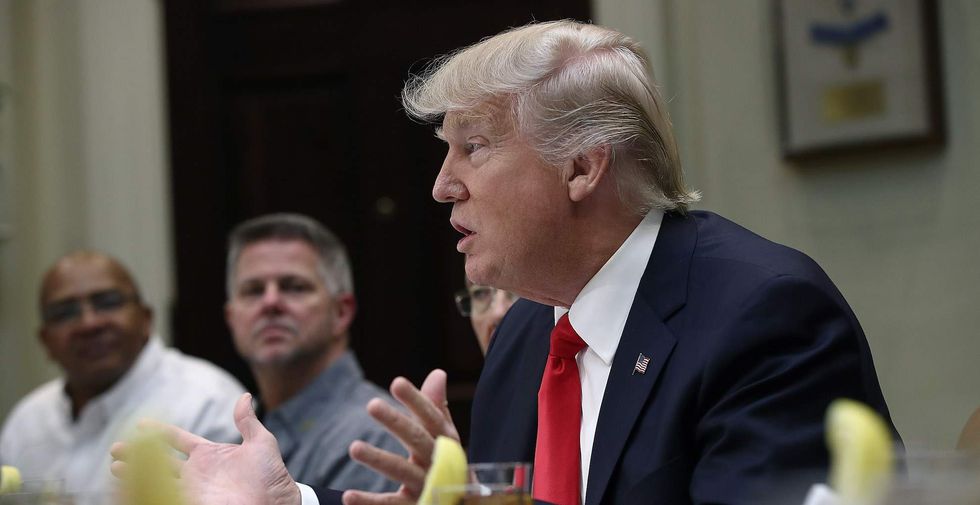
Win McNamee/Getty Images

President Donald Trump's administration has amended the temporary travel ban to allow Iraqi interpreters who have worked with the U.S. government and military into the country, the New York Times reported Thursday.
According to the report, the change came at the request of the Pentagon and has eased some frustrations generated by the executive order, which Trump signed last Friday.
The action instituted a 120-day moratorium on the U.S.'s refugee resettlement program and a 90-day freeze on would-be visa applicants from seven Muslim-majority countries from entering the U.S. The original order also applied to those who hold so-called Special Immigrant Visas, which are issued to interpreters who served the U.S. during its occupation of the Middle Eastern country between 2003 and 2011.
The U.S. Embassy in Baghdad announced the change in a statement to the Times:
The U.S. Government has determined that it is in the national interest to allow Iraqi Special Immigrant Visa (SIV) holders to continue to travel the United States.” Iraqis who have received the visas, the statement said, may use them , and the “U.S. Embassy in Baghdad will continue to process and issue SIVs to applicants who are otherwise qualified.
While most Republicans have toed the party line on the president's order, many have expressed concerns about the executive action's rollout. On Wednesday, Rep. Duncan Hunter (R-Calif.), a military veteran, said he agrees with the order, but called for some exemptions.
"I totally agree with Trump's executive order, but there should be a few exceptions in the Iraqi interpreters who helped our American forces on the ground and are still helping them. Those guys to me should be an exception to his rule," he said on Fox News' "Fox and Friends."
In addition, on the heels of Trump's signing of the travel freeze, Secretary of Defense James Mattis began compiling a list of Iraqis who worked with the military whom he believes should be exempted from the executive order, according to The Hill.
And in a statement to the Los Angeles Times, Pentagon spokesman Capt. Jeff Davis said Monday: "Even people that are doing seemingly benign things in support of us — whether as a linguist, a driver, anything else — they often do that at great personal risk."
"So people who take these risks are really making a tangible signal of support to the United States," he continued, "and that’s something that will, and should be, recognized."
Hunter and Rep. Adam Kinzinger (R-Ill.) urged Trump in a Jan. 30 letter to support Mattis' exemption requests.
After learning that the order had been amended Thursday to allow Iraqi interpreters to travel to the U.S., one former interpreter, who was identified only as Munther A., told the Times he was "shocked all over again."
Right after Trump signed the order, the 37-year-old ex-interpreter and his family were on Saturday ushered off a Turkish Airlines flight in Istanbul bound for the Kennedy Airport. Instead, they were forced to fly back to Baghdad.
Munther A., after scrambling to find somewhere to live for nearly a week, is now on his way to the U.S. In fact, he and his family were boarding a flight leaving Baghdad while he was talking to the Times.
Since 2007, the State Department has issued more than 1,700 SIVs to Iraqi interpreters, though only 19 have been given out in the last three years, the Times reported.
Trump initially said the controversial executive order was intended to give American officials the freedom to more thoroughly vet travelers from Iraq and six other Muslim-majority countries. However, interpreters had already undergone intense background checks before they were cleared to work with U.S. forces.
The Pentagon argued that SIV holders should be exempted from the travel ban because they had demonstrated their commitment to American military forces.
The other major legal concern surrounding Trump's executive order was the status of lawful permanent residents, or "green card" holders. On Wednesday, White House Counsel Don McGahn issued an "authoritative guidance" seeking to clarify that the order does not apply to LPRs, even if they are from one of the seven earmarked countries, according to Politico.
"They no longer need a waiver because, if they are a legal permanent resident, they won't need it anymore," White House press secretary Sean Spicer told reporters Wednesday.